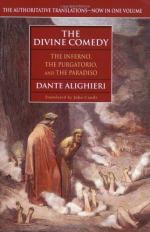I thus: “As wax by seal, that changeth
not
Its impress, now is stamp’d my brain by thee.
But wherefore soars thy wish’d-for speech so
high
Beyond my sight, that loses it the more,
The more it strains to reach it?”—“To
the end
That thou mayst know,” she answer’d straight,
“the school,
That thou hast follow’d; and how far behind,
When following my discourse, its learning halts:
And mayst behold your art, from the divine
As distant, as the disagreement is
’Twixt earth and heaven’s most high and
rapturous orb.”
“I not remember,” I replied, “that
e’er
I was estrang’d from thee, nor for such fault
Doth conscience chide me.” Smiling she
return’d:
“If thou canst, not remember, call to mind
How lately thou hast drunk of Lethe’s wave;
And, sure as smoke doth indicate a flame,
In that forgetfulness itself conclude
Blame from thy alienated will incurr’d.
From henceforth verily my words shall be
As naked as will suit them to appear
In thy unpractis’d view.” More sparkling
now,
And with retarded course the sun possess’d
The circle of mid-day, that varies still
As th’ aspect varies of each several clime,
When, as one, sent in vaward of a troop
For escort, pauses, if perchance he spy
Vestige of somewhat strange and rare: so paus’d
The sev’nfold band, arriving at the verge
Of a dun umbrage hoar, such as is seen,
Beneath green leaves and gloomy branches, oft
To overbrow a bleak and alpine cliff.
And, where they stood, before them, as it seem’d,
Tigris and Euphrates both beheld,
Forth from one fountain issue; and, like friends,
Linger at parting. “O enlight’ning
beam!
O glory of our kind! beseech thee say
What water this, which from one source deriv’d
Itself removes to distance from itself?”
To such entreaty answer thus was made:
“Entreat Matilda, that she teach thee this.”
And here, as one, who clears himself of blame
Imputed, the fair dame return’d: “Of
me
He this and more hath learnt; and I am safe
That Lethe’s water hath not hid it from him.”
And Beatrice: “Some more pressing care
That oft the memory ’reeves, perchance hath
made
His mind’s eye dark. But lo! where Eunoe
cows!
Lead thither; and, as thou art wont, revive
His fainting virtue.” As a courteous spirit,
That proffers no excuses, but as soon
As he hath token of another’s will,
Makes it his own; when she had ta’en me, thus
The lovely maiden mov’d her on, and call’d
To Statius with an air most lady-like:
“Come thou with him.” Were further
space allow’d,
Then, Reader, might I sing, though but in part,
That beverage, with whose sweetness I had ne’er
Been sated. But, since all the leaves are full,
Appointed for this second strain, mine art
With warning bridle checks me. I return’d
From the most holy wave, regenerate,
If ’en as new plants renew’d with foliage
new,
Pure and made apt for mounting to the stars.




